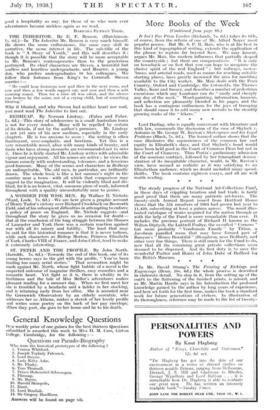Lord Darling, who is equally conversant with literature and with
law, commends the discussion of the case of Shylock v. Antonio in Mr. George W. Keeton's Shakespeare and his Legal Problems (Black, 7s. 6d.). The learned author shows that the case illustrates the separateness of the common law and equity in Elizabeth's days, and that Shylock's bond would have been held good in the Court of Common fleas but not in the Court of Chancery. Thus Portia's preliminary admission of the usurious contract, followed by her triumphant demon I stration of its inequitable character, would, in Mr. Keeton's view, have seemed as realistic as it was satisfying to an Elizabethan audience, which no doubt included many spend- thrifts. The book contains eighteen essays, and all are well worth reading.
















































 Previous page
Previous page